DISCUSSION: IMPOSSIBLE
Discussion: Impossible - Mission: Impossible III (2006)
Movie Feature
Ali Gray,
Matt Looker,
Becky Suter,
Ed Williamson
22nd July 2018
Another installment of the most original feature series in online history: the one where four people get together over email to force themselves to talk about the Mission: Impossible movies, instead of just enjoying them like everyone else on the planet. Today: Mission: Impossible III, directed by Jonathan Jonathan Abrams.
Discussion: Impossible - Mission: Impossible (1996)
Discussion: Impossible - Mission: Impossible II (2000)
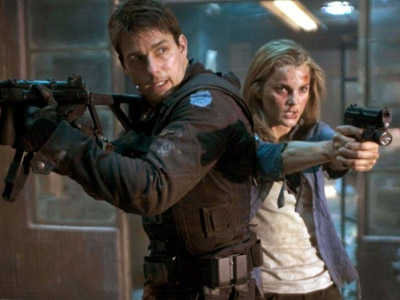
Ali: Mission: Impossible III then. By the way, the thing I dislike most about this franchise is its punctuation. Is it Mission: Impossible 3? Or Mission: Impossible III? MI3 or M:I-3 or M:I-III? Things get even worse from Ghost Protocol onward when they introduce the dash. It's exhausting.
Anyway. Woof! Until Fallout, this was by far my favourite Mission: Impossible movie. It's the first film in the series that feels modern and slick and more in step with the blockbusters of the 21st century. It starts with that incredible scene of Ethan Hunt tied to a chair, the smug draining from him by the second, which was definitely an intentional move to absolve him of the sins of the past. It's all high tempo, the action scenes are great (if not Ghost Protocol great) and the character interplay is on point. And it was JJ Abrams' first film. HIS. FIRST. FILM.
Matt: There's definitely an intent here to bring the franchise more in line with 'covert spy operations' rather than the action blockbuster of the previous film. And while it's Abrams' first movie, he obviously had a ton of experience with this genre in Alias. This film definitely feels like an extension of that show: exploring the blurred line between duty and a personal life, the inter-organisation double-cross (rather than the one motivated by greed in the first film) and, as you say, the slicker, but more down-to-earth action sequences.
Becky: I didn't really watch Alias but I can see the parallels between that and M:I:iii [Oh COME ON - Ali] - a super spy trying to conceal their true career/identity from their friends and family. It builds on that idea of Ethan that we glimpse in the last film of him being an actual human being and I liked him trying to interact with that bloke from Heroes and Jesse Pinkman. So, a nice touch from JJ there.
Ali: I think JJ Abrams has been very lucky in his career because more than once he has directed a sequel/remake where someone else has already been allowed to fail. Without Mission: Impossible 2, M:I-3 wouldn't feel half as great. Without the prequel trilogy, Star Wars: The Force Awakens wouldn't have had quite such an easy ride. It's a unique situation to find one's self in, where you have templates on what to do but also what NOT to do - success is almost guaranteed as long as you avoid the pitfalls that others already fell in. All of this sounds like I'm talking down M:I-3, which I'm not, because I think it's genuinely brilliant and exciting and innovative - but it almost feels like a natural reaction to feel after M:I-2.
Becky: This was after Bond was rebooted as well so it was trying to thrive in a new spy-era - I did notice a lot of shaky cam. Less emphasis on technology and more on the action, although it feels at points like Abrams can't quite keep up.
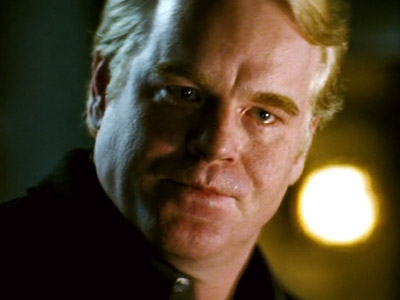
Matt: I have to say though that I remembered this film being better than what I got from it on this rewatch. I saw it about a week ago and I'm already struggling to remember much to cling on to for this discussion. At this point it just feels to me like a very serviceable spy thriller that is hugely elevated by Philip Seymour Hoffman's truly sinister performance. The way he says "I'm going to find her, I'm going to hurt her" has always stuck with me from the first watch, and it still gave me the creeps again this time round.
Becky: I enjoyed it more than I remembered, but then straight after M:I-2 it's not hard: the quality of the team is better, and so the heists work better because of their dynamics, e.g The Vatican set-piece. It's funny and intricate and that's what elevates it for me, even if it falls down elsewhere.
Ali: The Vatican sequence is arguably one of the series' better set-pieces, but because it doesn't really have a central hook, it's overlooked in favour of the Burj Khalifa sequence or the Langley heist. But it's so good! Proper team-work over multiple locations, loads of really innovative uses of tech and espionage, and loads of humour - I love how Hunt, dressed as Philip Seymour Hoffman's character, just says "S'up" when they see him through the manhole. It's filled with loads of little touches like that.
Ed: Fuck, Hoffman is brilliant. I was honestly watching it thinking we were so blessed to have an actor like that who'd sometimes show up in a daft blockbuster and just commit to it fully.
Ali: I can't think of any other actor who could so seamlessly switch between Ben Stiller comedies, Todd Solondz dramas and Tom Cruise blockbusters. I mean, who does that? Who has that kind of range? It's obscene. He's just scary watchable in this movie, and he makes everyone else raise their game.
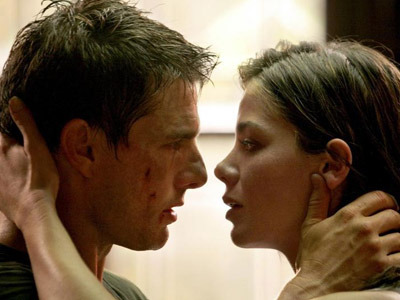
Ed: I had to get over one of my regular bugbears: character learns something and grows in previous film by dint of a relationship, ie when he chose to save Thandie Newton at risk to the mission, and then ended up with her at the end, but by the next film she's just disappeared and isn't mentioned, which makes me think that growth was quite cheap and convenient. So basically they just boned for a few days and then he was like maybe we should see other people? Or maybe his new haircut was the dealbreaker?
Becky: I think Newton was asked back but she refused, so they created Michelle Monaghan's character to make Hunt 'normal' and yet again, the female character is treated badly. For starters, there is zero chemistry between the two of them, and she goes from typical butter-wouldn't-melt
to suddenly knowing how to fire gun at point blank range and being totally fine with killing someone.
Ed: Yeah she's a sort of signifier of his humanity but she's not allowed to do much. You could argue, if you were bad at arguing, "But she gets to kill the final bad guys at the end! See, AGENCY!" But as you say, why on Earth she's suddenly a badass with a gun and, in particular, has the presence of mind in a high-stress situation completely out of her sphere to check the reflection in the chrome thing makes no sense.
Becky: Then there's the fact she's a doctor, because of course she's a selfless, caring person who doesn't question the fact that her boyfriend is going on random conferences when he works for the transport department, is absolutely ripped and has no family and friends. Spies never fall for architects or marketing managers in their Ordinary Life, do they?
Matt: I have to say I slightly disagree about the whole relationship issue here. I just about buy it, but only because Michele Monaghan is doing all the heavy lifting to make it believable. She's massively underwritten as a character, but I think you'd notice it more if Monaghan wasn't working so hard to sell it in all her scenes.
Becky: Jules is a one-dimensional character brought in to make Ethan look three-dimensional. She's the girlfriend in the 'Missing Lover Footage' they aped in Community, when the hero's girlfriend is missing or dead and so he sits in the dark and watches her over and over again in a home movie and she's always beautiful and loving to the point of stupidity.
Matt: It comes down to a question of balance between spending time with the characters and getting on with the action. They don't get that balance right here, I don't think, but I can see how they thought they did because they wrote her as a shorthand character that only serves Ethan Hunt's storyline: she represents his desire for a normal life, and the fact that she's a doctor is supposed to mean that she is highly capable and calm-headed in high-pressure situations, so that covers off (badly) her skills at the end. What I would have liked to see more of is the revelation when she discovers he is a spy. It all ends on a happy note, but Abrams doesn't even really give her the benefit of one satisfactory scene in which she can grill her husband about his job. It just ends as that's starting.
Ali: Matt, if you want a fun movie where a man's wife finds out she's married to a spy, I recommend you watch a little indie movie called TRUE LIES.
Matt: I will say that it's a neat trick to get her to have to kill and then revive Hunt. After finding out that he has been lying to her about being a spy, it's a great way to show that he DOES trust her and love her and that shouldn't be in any doubt because he is literally placing his life in her hands. That just about gets us past the whole "How am I supposed to believe anything you say?" argument.
Ali: Listen, Mission: Impossible III deserves all the credit it receives, because it provided a template for some of the most exciting action movies of the last 20 years, and it did so even though it inherited stupid John Woo's shiny turd and an espionage thriller that was made in 1996 but might as well have been made in 1896. For all intents and purposes, Mission: Impossible III is the first true Mission: Impossible movie.
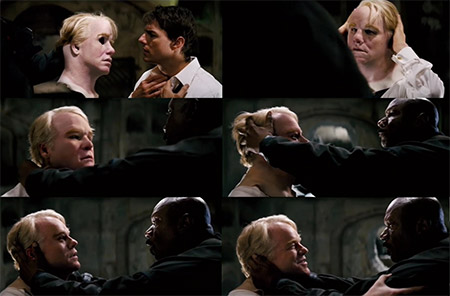
Matt: I know, I know, three films in and I'm still hung up on the masks in this franchise, but I have mixed feelings about how they show Ethan Hunt become Philip Seymour Hoffman in this movie. On the one had, I love the progress that's shown in getting the disguise just perfect, I love the colouring and detail and texture added to the mask as it's made, and I love seeing Hunt get padded out to show the prep that goes into giving him the same body shape. I also particularly love that Abrams subverts your expectations by moving the camera behind Ving Rhames' back and you expect to see a fully-formed Seymour Hoffman in his place, but it's not quite there yet and the mask has to be pushed and manipulated and CGI-ed into place.
Ali: The peril of over-explaining. I remember in The Adjustment Bureau, the explanation for how the agents got around so quickly was because of their magic hats. HARD PASS. I don't think it's that bad here, in fact, I appreciated the insight. I didn't feel the need to question it further, I was happy with what I got. Matt: let the masks thing go. In a way it is a mask you yourself have begun to hide behind.
Matt: I think the more you focus on how the tech works on a practical 'real-life' level, the more questions that arise. How do they get the body suit right? What about any height difference? If the mask has to be pushed into place, what is it made from and how does it stick? I know this sounds pedantic, but do you know what I mean? The more time you spend on something, the more time you give the audience to question it and, actually, if Tom Cruise was just already in a fully-formed Seymour Hoffman mask, I don't think anyone would think twice about it.
Becky: I can put aside the practicalities of it all, but it does get to the point where you start looking at any given character and think, "I bet that's a mask, that." Jumping back to the second film I was so sure the Russian guy wasn't even a real actor, he was just Cruise in a mask all along to make the set up with Brendan Gleeson work.
Ed: I didn't like seeing the process of making the mask either: the fact that they crop up sometimes and you're not told when was kind of the point I thought, and this just destroys that.
Matt:
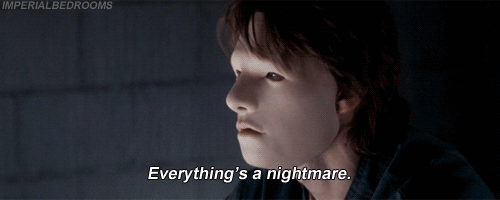
Becky: I liked seeing how the masks were made - there's a whole machine!
Matt: Okay, forgetting the masks thing for a minute then IF I CAN, here's something I really enjoyed in this film: everything about Laurence Fishburne's IMF chief. I love the angry sass he brings to the debrief scenes with lines like "Please don't interrupt me when I'm asking rhetorical questions" and "It is unacceptable that chocolate makes you fat, but I've eaten my share and guess what?" And I love that, because he is seen as an obstacle to Ethan Hunt, as someone impeding the 'mission', you start to suspect that he could be working with Seymour Hoffman, but then it turns out to be Crudup. And of course it makes sense because every time Crudup helps Hunt it's really only to help him retrieve the Rabbit's Foot, which is what Seymour Hoffman wants all along, but it's a very cool bait-and-switch. I remember this really catching me off-guard when I first saw it.
Ali: You know what I really enjoy? Tom Cruise has a different IMF sugar daddy in every single one of these movies. Literally every single one. Jon Voight. Anthony Hopkins. Laurence Fishburne. Tom Wilkinson. Alec Baldwin. Every movie has a different Charlie and a different set of Angels, with Tom as Farrah Fawcett. Or something like that.
Ed: Another signifier of supposed normality, more for Cruise than for Hunt, is his Rubber Soul jacket/jeans combo. Variations on which are sported in the Jack Reachers, War of the Worlds and I think Vanilla Sky? He's like an alien putting on clothes he's seen Tim the Toolman Taylor wear and saying "Normalman's the name, Mike Normalman, pleased to meet you, fellow human person," while shaking someone's hand much too hard. I think he made a very conscious choice to be "relatable" some time around the early oughts.
Matt: Continuing my streak of completely overthinking aspects of these films: can we talk about the disposable Kodak camera containing the secret retina-scanning virtual presentation of Hunt's mission? First, a cassette tape, then exploding sunglasses, and now a single-use camera that, even in 2006, surely no one was using outside of weddings and community art projects. Whose job is it to think of these things? And why choose that object? Wouldn't it be easier for Crudup to tap the row of hanging USB memory sticks? Or sunglasses? Or cassettes? Obviously, I get it - it's fun and a nice little entertaining thing that they can mix up for every film, but it tickles me that super-advanced technology is being housed in a near-obsolete one. It reminds me of Nintendo releasing the next big product in their entertainment range: the foldable cardboard box.
Becky: Dude, chill.
Matt: Feature idea for the next Mission: Impossible: How will Ethan Hunt receive his next mission? Via a cereal packet? A self-service checkout? One of those virtual photo frames that switches between pictures? A high-tech balloon? A pedometer? The laser side of a laser disc copy of Mission: Impossible 2? And so on.
Ali: I'd like to think that eventually it'll just be a bloke shouting the mission over a fence.
Matt: I have my list of notes, and I can't rest until I have talked through every single item. So what do you guys think of that...
Becky:
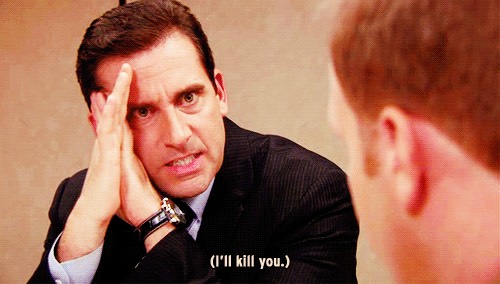
Ali: I like the lip-reading thing. It's allowed. I'm allowing it. They establish it in the party scene at the beginning. It's a smart way of communicating, although if the IMF camera couldn't see Billy Crudup's face then he might as well have just stuck a post-it note on it.
Ed: Here is my question having now watched three of them. Do these films do well because people like the format/stories etc, or because people like Tom Cruise?
Matt: I think it's a little bit of both, but it's only after the next one where the films really started to trade on the whole "Tom Cruise does his own epic stunt!" thing.
Ed: As it's his co-production, I presume he bought the rights so he could put himself in them? Which is quite far-sighted, as we were way off the whole franchise dominance thing when they started. And it's an interesting study in star power, because effectively it's him pushing himself onto the audience, as opposed to there being audience demand and him meeting it. Though it's not all one-sided obviously.
Ali: They were always Tom Cruise movies, but it's only from Ghost Protocol onwards they became Tom Cruise Movies i.e. 100% extremely Tom Cruise, all day err day. M:I-Thr33 performed quite poorly and - as ridiculous as it sounds now - his star power was publicly questioned, even by his own studio head. It's weird how this franchise has ebbed and flowed along with his public perception. Even with the whole Scientology thing, I think most people are still glad he's around and making these movies happen - and putting so much of himself in them. The reception to Fallout is a good indicator of that.
Becky: Tom Cruise is going to entertain you whether you want it or not.
Ali: I was at the Empire Awards the year he was there, and I have never seen such a huge crowd of people gather around one person so fast - and have that one person work so diligently and honestly to attempt to satisfy every single last one of them. He was signing autographs for around 45 minutes, and he didn't have to do ANY of them, no one would have blamed him for swiping his goody bag and fucking off to Mahiki. I don't think there's ever been a moment in his career when it felt like audiences were being force-fed Tom Cruise movies: the demand for him has been pretty constant for the last 25 years or so, I'd say.
Matt: One last thing on this: at the start of the film, Ethan Hunt is a horribly goofy boyfriend. Is that... a role he is playing to blend in? Because surely he knows that can't be sustainable for the rest of his life.
Ali: I like the idea that Ethan Hunt, when removed from highly dangerous matters of national security, is actually a huge dork. So no, I don't think he's playing a role, I genuinely think he has a chubby for traffic patterns.

Support Us
Follow Us
Recent Highlights
-
Review: Jackass Forever is a healing balm for our bee-stung ballsack world
Movie Review
-
Review: Black Widow adds shades of grey to the most interesting Avenger
Movie Review
-
Review: Fast & Furious 9 is a bloodless blockbuster Scalextric
Movie Review
-
Review: Wonder Woman 1984 is here to remind you about idiot nonsense cinema
Movie Review
-
Review: Borat Subsequent Moviefilm arrives on time, but is it too little, or too much?
Movie Review
Advertisement
And The Rest
-
Review: The Creator is high-end, low-tech sci-fi with middling ambitions
Movie Review
-
Review: The Devil All The Time explores the root of good ol' American evil
Movie Review
-
Review: I'm Thinking Of Ending Things is Kaufman at his most alienating
Movie Review
-
Review: The Babysitter: Killer Queen is a sequel that's stuck in the past
Movie Review
-
Review: The Peanut Butter Falcon is more than a silly nammm peanut butter
Movie Review
-
Face The Music: The Bill & Ted's Bogus Journey soundtrack is most outstanding
Movie Feature
-
Review: Tenet once again shows that Christopher Nolan is ahead of his time
Movie Review
-
Review: Project Power hits the right beats but offers nothing new
Movie Review
-
Marvel's Cine-CHAT-ic Universe: Captain America: Civil War (2016)
Movie Feature
-
Review: Host is a techno-horror that dials up the scares
Movie Review
